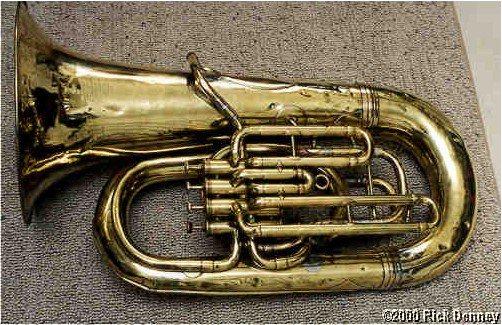John Caves wrote:What tools do think would be necessary to begin basic tuba-sousa' repair?

(OK, I know I'm an a@@hole, but there it was; low, slow, and over the plate...

John Caves wrote:What tools do think would be necessary to begin basic tuba-sousa' repair?

A fast Eddie is like a rolling pin on an extended shaft. You clamp the shaft in a dent-rod vice, and use the fast Eddie to roll out dents in bells. It's a really handy tool for cleaning up a bell. Made and sold by Ferree's.Dean E wrote:Never heard of Fast Eddie.

Rick, I know that Ferree's has rollers like the Fast Eddie, but the original was made and sold by Ed Strege of Badger State (who I think still sells them).Rick Denney wrote:A fast Eddie is like a rolling pin on an extended shaft. You clamp the shaft in a dent-rod vice, and use the fast Eddie to roll out dents in bells. It's a really handy tool for cleaning up a bell. Made and sold by Ferree's.Dean E wrote:Never heard of Fast Eddie.
Rick "who thinks it's useful even for those who don't have dent balls or a Z60" Denney


Even though I have four different sizes of rollers... including the nifty tapered one for small bells, I am currently yearning for a set of these that Ferree's offers:Dean E wrote:Never heard of Fast Eddie. He doesn't seem to live on Google.Chuck(G) wrote: Not so much as a dent ball set or even a Fast Eddie in the lot!

Great, its good to see someone with such ambition!John Caves wrote:I am going to invest in some repair tools to begin working on my horns. What tools do think would be necessary to begin basic tuba-sousa' repair? Mandrels, Dent Balls, Dent rods...?
Thanks for any info.







What he said.iiipopes wrote:I'm lucky in that, knowing good instruments can be fubar, my butchering was done on a POS that was purchased specifically for the purpose. I learned several things:
1) What I can and can't do myself, given my abilities and available tools,
2) When I need something done, exactly what to ask for so I don't waste diagnostic time, or at least narrow down the universe to specific areas if it's something nebulous, and
3) Develop an appreciation of the time, effort, and ultimately what a great deal I'm getting because usually not only is the problem fixed, but along the way a detail or two is customized for me and my ergonomics and style of playing, making the instrument play even better for me.
